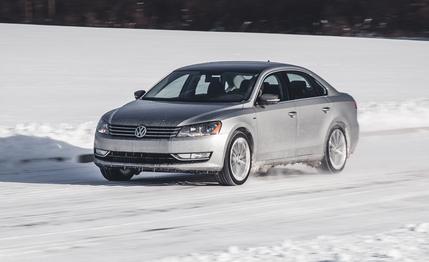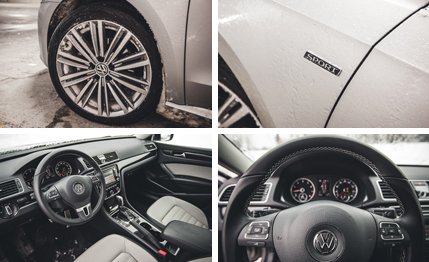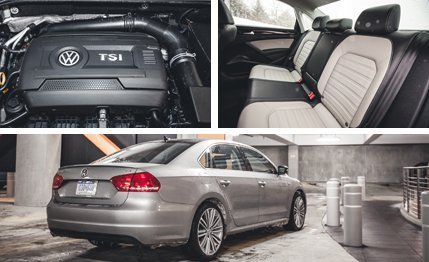 Instrumented Test
TESTED
Instrumented Test
TESTED
Alongside GT and Limited, Sport is among the most prolific of automotive trims. Most vehicle makers offer a Sport something or other—if not several—and VW is joining the parade for 2014 with this new Passat, which snuggles into the lineup between the SE and range-topping SEL. In addition to badges (yea!), the Passat Sport’s long list of cosmetic baubles includes front fog lamps, a rear spoiler, faux-carbon-fiber interior trim, aluminum pedal caps, two-tone leather-trimmed seats, stainless-steel sill plates, paddle shifters, and 10-spoke, 19-inch wheels wrapped in 235/40 Continental ContiProContact rubber. Sports with white or silver paint get a black roof and black mirror caps.
Hard Core? Think Comfy Core
Notice that the above list doesn’t include upgraded shocks, stiffer springs, bigger anti-roll bars, quicker steering, altered gearing, a freer-flowing exhaust, a power upgrade, an intake sound enhancer, or anything of the sort. Excepting the larger, 19-inch wheels and deep-dish seats that VW quizzically calls “comfort sport,” the Passat Sport focuses solely on visual sizzle. But, hey, buyers can choose between a paddle-shifted six-speed conventional (i.e., not dual clutch) automatic and a five-speed manual.

What the 2014 Passat Sport does offer is plenty of equipment, as well as a comfortable environment from which to experience the car’s new 170-hp, 1.8-liter turbo four-cylinder. With 184 lb-ft of peak torque on tap from 1500 rpm, the engine allows the Passat to compete more directly with the performance of mid-size segment sales leaders such as the Honda Accord and Ford Fusion. It’s at least a full second quicker to 60 than last year’s Passat with its base 2.5-liter five-cylinder. In our tests, the Passat Sport 1.8T automatic hit 60 mph in 7.5 seconds, besting the 8.3-second performance of the 178-hp Ford Fusion 1.6 EcoBoost and 7.7-second time of the 185-hp Honda Accord EX 2.4L CVT. The force-fed 1.8-liter will supplant the old 2.5-liter five in all Passats eventually, and it’s the same Mexican-built gen-three EA888 four-cylinder headed for the Golf, Beetle, and Jetta for 2014. The small-diameter turbo spools quickly and provides good throttle response with little or no discernible lag; part-throttle response and around-town flexibility are excellent. The 1.8T pulls well all the way to its 4800-rpm power peak and beyond and rewards wide-open-throttle applications with a throaty growl.
Driven conservatively, the six-speed auto in our test car didn’t waste much time getting into the taller gears, and the car will cruise along at 1400 rpm on flat ground for long stretches of highway. One side effect of this fuel-economy optimization is a slight low-frequency rumble that can be heard and felt inside the cabin. Of course, you can use your own gearbox “programming” by choosing the gears manually or by simply opting for the Passat Sport’s five-speed manual. Over 839 miles of testing, our lead-soled shoes achieved 29 mpg, quite impressive for a 3317-pound mid-size sedan and smack dab in the middle of its 24/34-mpg EPA estimates. And unlike most other Euro sedans—or even the V-6 Passat—the 1.8T burns regular unleaded.
The Sport comes with VW’s new OnStar-like connectivity system, Car-Net. After a six-month free trial, the Verizon-based system will be available across all 2014 model lines at $199 per year for the full suite of services. Accessed via overhead buttons, Car-Net includes automatic crash notification, roadside assistance, manual emergency calling, and live destination assist.

Opting for the well-kitted Passat Sport checks most of the boxes for available comfort, convenience, and appearance features, the only notable exceptions being navigation, pushbutton start, a power sunroof, the Fender premium audio system, and a power front-passenger seat. For those items, you’ll need to pop for one of the options packages or move up to SEL Premium trim.
Sport Is as Sport Does
Even though neither a sport suspension nor drivetrain performance upgrades are included with the Sport trim, the big, roomy sedan (it has segment-leading rear legroom) displays its inner Teuton when hustling down a twisty back road. The car’s electrically boosted steering, even though lightly weighted, is linear and precise, and the suspension is well damped without being jouncy or choppy over uneven pavement. The brakes exhibited good top-of-pedal response and linear control, as well as zero fade in our 70-to-0-mph tests. In those brake tests, the 19-inch tires proved to be good for more than just looks—our Passat Sport stopped in 163 feet, matching the stopping performance of the BMW 320i and bettering that of an Audi 2.0T Quattro we tested recently. So there’s at least a little extra Sport in here after all.